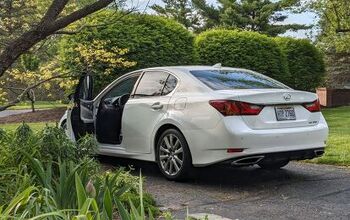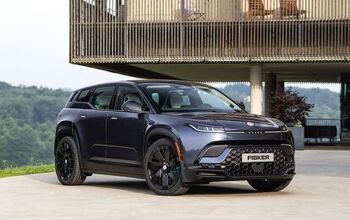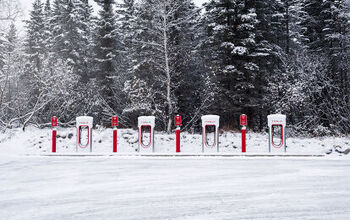NHTSA Considers Increasing Fines for Emission Violations

The National Highway Traffic Safety Administration is considering increasing penalties for automakers that fail to meet fuel-efficiency requirements. Though this could be considered a restoration of older standards, depending upon your perspective.
Shortly before leaving office, President Donald Trump postponed a regulation from the last days of the Obama administration that would have effectively doubled fines for vehicle manufacturers failing to meet Corporate Average Fuel Economy (CAFE) requirements. Automakers had been complaining that the rule would have dramatically increased operating costs, suggesting that would trickle down to vehicle pricing and give manufacturers selling carbon credits an unfair advantage.
Though there are plenty of people who already believe the idea of paying a rival business to “offset emissions” in order to pollute more is kind of a silly premise.
A U.S. appeals court in overturned the former administration’s decision to suspend the 2016 regulation in the summer of 2020. While Obama originally wanted the increased penalties to take effect for the 2019 model year, Trump managed to get them delayed until 2022. But the original plan was to suspend the increased fines indefinitely, since the previous administration was focused on deregulation as its main method of spurring the domestic economy. This seems to be counter to the Biden administration’s strategy and the NHTSA has been fairly aggressive in pursuing new regulatory actions since the change in leadership.
According to Reuters, Congress ordered federal agencies to adjust CAFE-related civil penalties in 2015 to account for inflation. This led the NHTSA to raising fines to $14.00 (from $5.50) for every 0.1 mile per gallon new cars and trucks consume in excess of required standards. Since then, the interested parties have been throwing in their two cents.
From Reuters:
In March, Tesla urged a U.S. appeals court to reinstate the higher fuel economy penalties and said the Biden administration ignored the ongoing impact of the Trump rule on the credit-trading market.
Tesla, whose electric cars produce zero emissions, sells credits to other automakers to reduce their burden of complying with regulations and argued the Trump rule change makes those credits less valuable.
FCA paid a total of nearly $150 million for failing to meet 2016 and 2017 requirements.
NHTSA said its analysis showed reinstating the earlier hike could boost penalties for the 2019 model year alone by $178.5 million, a figure that does not include the impact on credit trading.
Stellantis said earlier this month in a securities filing costs related to potential higher CAFE penalties could be about 521 million euros ($609 million).
Meanwhile, the NHTSA proposed increasing CAFE requirements by 8 percent annually for 2024 through 2026, reversing a Trump-era policy that rolled back higher requirements to ensure consumer vehicle choices remained robust and pricing remained low (at least that’s how it was framed). While the above is fine with just about any manufacturer that prioritizes EVs, legacy brands that still need to sell hundreds of thousands of gas-burning vehicles have less to celebrate. Automotive lobbies generally oppose the hike and have been begging regulators not to retroactively apply penalties to vehicles already produced all summer.
The Department of Transportation and NHTSA will be giving the public 30 days to comment on whether the government should reinstate the 2016 rules imposing higher penalties — which would include vehicles from the 2019 model year.[Image: LanaElcova/Shutterstock]

A staunch consumer advocate tracking industry trends and regulation. Before joining TTAC, Matt spent a decade working for marketing and research firms based in NYC. Clients included several of the world’s largest automakers, global tire brands, and aftermarket part suppliers. Dissatisfied with the corporate world and resentful of having to wear suits everyday, he pivoted to writing about cars. Since then, that man has become an ardent supporter of the right-to-repair movement, been interviewed on the auto industry by national radio broadcasts, driven more rental cars than anyone ever should, participated in amateur rallying events, and received the requisite minimum training as sanctioned by the SCCA. Handy with a wrench, Matt grew up surrounded by Detroit auto workers and managed to get a pizza delivery job before he was legally eligible. He later found himself driving box trucks through Manhattan, guaranteeing future sympathy for actual truckers. He continues to conduct research pertaining to the automotive sector as an independent contractor and has since moved back to his native Michigan, closer to where the cars are born. A contrarian, Matt claims to prefer understeer — stating that front and all-wheel drive vehicles cater best to his driving style.
More by Matt Posky
Latest Car Reviews
Read moreLatest Product Reviews
Read moreRecent Comments
- Dartman https://apnews.com/article/artificial-intelligence-fighter-jets-air-force-6a1100c96a73ca9b7f41cbd6a2753fdaAutonymous/Ai is here now. The question is implementation and acceptance.
- FreedMike If Dodge were smart - and I don't think they are - they'd spend their money refreshing and reworking the Durango (which I think is entering model year 3,221), versus going down the same "stuff 'em full of motor and give 'em cool new paint options" path. That's the approach they used with the Charger and Challenger, and both those models are dead. The Durango is still a strong product in a strong market; why not keep it fresher?
- Bill Wade I was driving a new Subaru a few weeks ago on I-10 near Tucson and it suddenly decided to slam on the brakes from a tumbleweed blowing across the highway. I just about had a heart attack while it nearly threw my mom through the windshield and dumped our grocery bags all over the place. It seems like a bad idea to me, the tech isn't ready.
- FreedMike I don't get the business case for these plug-in hybrid Jeep off roaders. They're a LOT more expensive (almost fourteen grand for the four-door Wrangler) and still get lousy MPG. They're certainly quick, but the last thing the Wrangler - one of the most obtuse-handling vehicles you can buy - needs is MOOOAAAARRRR POWER. In my neck of the woods, where off-road vehicles are big, the only 4Xe models I see of the wrangler wear fleet (rental) plates. What's the point? Wrangler sales have taken a massive plunge the last few years - why doesn't Jeep focus on affordability and value versus tech that only a very small part of its' buyer base would appreciate?
- Bill Wade I think about my dealer who was clueless about uConnect updates and still can't fix station presets disappearing and the manufacturers want me to trust them and their dealers to address any self driving concerns when they can't fix a simple radio?Right.


































Comments
Join the conversation
"According to Reuters, Congress ordered federal agencies to adjust CAFE-related civil penalties in 2015 to account for inflation. This led the NHTSA to raising fines to $14.00 (from $5.50) for every 0.1 mile per gallon new cars and trucks consume in excess of required standards. Since then, the interested parties have been throwing in their two cents." Interesting CONgress not only acknowledged inflation but ordered I suppose the NHSTA to triple their Yet Another Tax (YAT) which has not changed since 1997. I'm not sure who came up with the exact figure, but it seems whomever did was expected an inflation rate to be ***triple*** by 2030 in 2015 if we roughly use an assumed 15 year period between adjustments. If what's punitive in 1997 was a joke by 2015, what's punitive in 2015 should be a joke by 2030/32. Long in the future 2008 will be viewed as the beginning of the end of Pax Americana and perhaps Western Civilization. "NHTSA sets [4] and enforces [5] corporate average fuel economy (CAFE) standards for the United States light-duty automobile fleet, and in doing so, assesses civil penalties against manufacturers that fall short of their compliance obligations and are unable to make up the shortfall with credits obtained for exceeding the standards.[6] The civil penalty amount for CAFE non-compliance was originally set by statute in 1975, ***and beginning in 1997, included a rate of $5.50 per each tenth of a mile per gallon*** (0.1) that a manufacturer's fleet average CAFE level falls short of its compliance obligation. This shortfall amount is then multiplied by the number of vehicles in that manufacturer's fleet." https://www.federalregister.gov/documents/2021/01/14/2021-00278/civil-penalties
Yes, let's increase fines so manufacturers produce products that no one wants. I thought America is the last land where market economy rules. Supply and Demand. No one wants these electric turds. I travel between Savannah Georgia and Atlanta Georgia every two weeks for past five years, even during COVID. In all this time, on 4-5 hours driving, I have seen only 3 Teslas on I-16 connecting those two cities. There are considerable number of Teslas within Atlanta metro but not once you go out of town. See my children, plan is to force people to live in cities because these electric vehicle's range, and the charging station infrastructure does not support our lives in this vast beautiful land. Or perhaps we have to go back to using Greyhound buses to travel. Meanwhile ,Taliban have brand new ICE vehicles that this administration abandoned and they will use for a very very long time. I wonder why our military did not use electrics in Afghanistan???